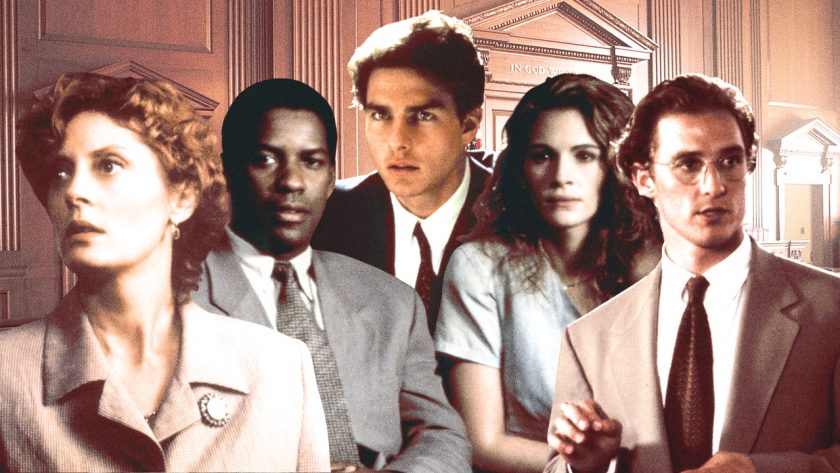During the third and final act of Oppenheimer, Christopher Nolan’s summer blockbuster about the father of the atomic bomb, the movie dramatically shifts in tone. There’s a tense, closed-door hearing about J. Robert Oppenheimer’s security clearance, where witnesses from his past are called in and grilled to a crisp. Later, we witness a heart-pounding Senate confirmation hearing for his adversary, Lewis Strauss. Treachery and machinations abound. By the time a clever young Senate aide played by Alden Ehrenreich smugly delivers the line, “the junior senator from Massachusetts, young guy, trying to make a name for himself … John F. Kennedy,” I was practically levitating. Though it was a biopic, Oppenheimer had managed to smuggle in one of my favorite genres: the legal thriller.
Specifically, I can’t get enough of ‘90s legal thrillers. In life’s endless journey of self-discovery, I was surprised to learn this. Maybe a little disappointed. I had always considered these to be movies that dads watch while standing two feet away from the television screen—and they are, indeed, a subset of classic ‘90s dad thrillers.
Ah, but we all become washed one day, my child.
It started with a bored rewatch of 1999’s Double Jeopardy, which was not what I would call “high quality” or even “legally sound in any way,” but there was a potent enough combination of nostalgia and easy streaming availability to keep me going. I burned through 1993’s The Firm (Tom Cruise joins a nefarious law firm connected to the mob), 1992’s A Few Good Men (Tom Cruise yells at Jack Nicholson in court), 1993’s The Pelican Brief (Denzel Washington and Julia Roberts team up to expose why two Supreme Court justices were assassinated), 1994’s The Client (Susan Sarandon helps a kid who gets ensnared in mob dealings), 1996’s A Time to Kill (Matthew McConaughey defends Samuel L. Jackson, who killed two men to avenge his daughter’s rape), 1997’s The Rainmaker (Matt Damon takes down an evil insurance company), and so on. Most of these are adaptations of John Grisham books and, as such, follow a similar formula: a young, idealistic lawyer from the South gets caught up in a conspiracy much bigger than they are, eventually persevering, but not before some nail-biting action and a rousing courtroom speech.
What a satisfying formula it is! Because movies hinged on big stars back then, we’re practically drowning in charisma. (Everyone also gets a chance to try their spin on a Southern accent, with varying levels of success.) If the fight between good and evil isn’t exactly nuanced—in the world of the ‘90s legal thriller, the righteous always prevail—the politics are better than you’d expect. (Villains include virulent racists, insurance companies, and oil and gas execs.) Along with the entertainment factor, there’s a swift competency to these films that’s inherently gratifying. Often, the scheme “goes all the way to the top.” I love it when it goes all the way to the top!
And there were some sublime fits, even amidst such a buttoned-up profession. In fact, this entire article might be an excuse for me to share Joel Schumacher’s campy interpretation of a mobster, played by Anthony LaPaglia, in The Client.



